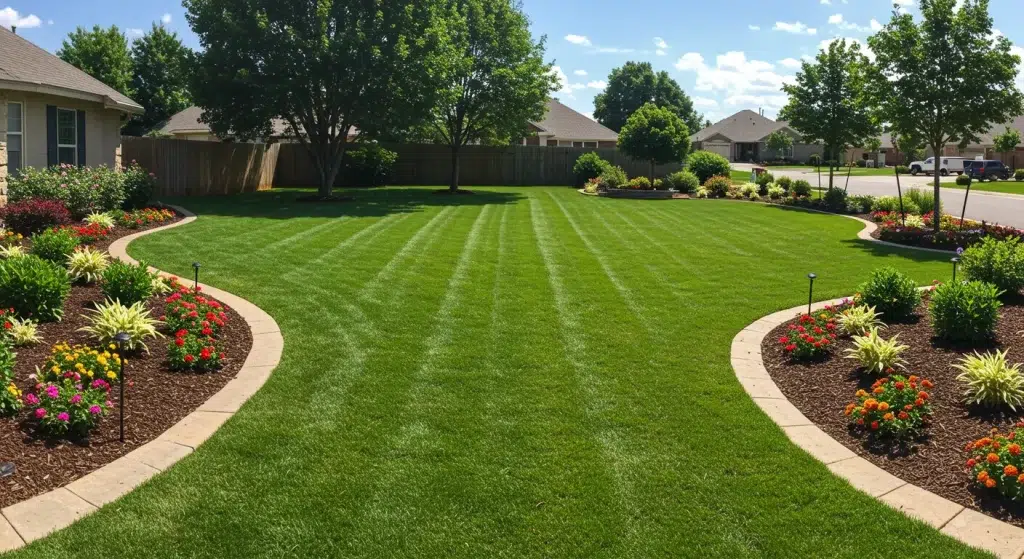Gonzales experiences a humid subtropical climate with hot summers, mild winters, and significant rainfall throughout the year. This environment creates favorable conditions for lawn growth but also presents challenges such as heat stress, excessive moisture, and seasonal pests. Maintaining a green and healthy lawn in this climate requires an approach that aligns with these conditions.
Choosing the Right Grass for Gonzales
Selecting the right grass type is crucial for long-term lawn health. Warm-season grasses perform best in Gonzales due to their ability to withstand heat and humidity. Some of the best options include:
- St. Augustine Grass – Thrives in the heat and provides a dense, green lawn with proper care.
- Bermuda Grass – Tolerates high foot traffic and grows well in full sun.
- Zoysia Grass – Offers drought resistance and a lush appearance but requires well-drained soil.
- Centipede Grass – Low maintenance and adapts well to sandy or acidic soils.
Proper Watering Techniques
Watering correctly ensures your lawn remains hydrated without promoting disease. Here are key watering tips for Gonzales lawns:
- Water early in the morning to reduce evaporation and allow time for absorption.
- Deep, infrequent watering (1-1.5 inches per week) encourages deep root growth.
- Adjust based on rainfall to prevent overwatering, which can lead to fungal growth.
- Use a rain gauge to track natural precipitation and supplement as needed.
Mowing Practices for Healthier Lawns
Mowing at the correct height and frequency prevents stress and promotes resilience. Follow these guidelines:
- Keep mower blades sharp to make clean cuts and reduce disease risk.
- Adjust mowing height based on grass type (St. Augustine: 2.5-4 inches, Bermuda: 1-2 inches, Zoysia: 1-2 inches).
- Avoid cutting more than one-third of the blade length to reduce shock.
- Leave grass clippings on the lawn as natural mulch to return nutrients to the soil.
Soil Health and Fertilization
Healthy soil supports strong grass growth. Conducting a soil test helps determine nutrient needs and pH balance. Best practices for fertilization include:
- Use slow-release fertilizers to provide consistent nutrition.
- Apply nitrogen-rich fertilizers in late spring and summer for active growth.
- Avoid over-fertilization, which can promote excessive growth and weaken the grass.
- Aerate compacted soil annually to improve water and nutrient penetration.
Dealing with Weeds, Pests, and Lawn Diseases
Gonzales’s climate supports weed growth and pests that can damage lawns. Implementing proactive measures helps maintain a healthy lawn.
Weed Control
- Pre-emergent herbicides in early spring prevent weed germination.
- Post-emergent herbicides target active weeds without harming grass.
- Regular mowing and proper watering reduce weed competition.
Pest Management
- Chinch bugs, armyworms, and grubs are common lawn pests in the area.
- Natural predators and beneficial nematodes help manage infestations.
- Insecticide treatments may be necessary for severe outbreaks.
Lawn Disease Prevention
- Fungal diseases like brown patch thrive in warm, humid conditions.
- Proper drainage and avoiding overwatering prevent fungal growth.
- Applying fungicides when needed helps manage outbreaks.
Seasonal Lawn Care Calendar for Gonzales
Maintaining a green lawn requires seasonal adjustments to lawn care practices. Follow this guide for year-round success:
Spring
- Apply pre-emergent herbicide.
- Begin fertilization and aerate if needed.
- Start mowing regularly as growth resumes.
Summer
- Increase watering during dry periods.
- Monitor for pests and treat as necessary.
- Adjust mowing height to reduce heat stress.
Fall
- Apply a final round of fertilization for winter root strength.
- Overseed thin areas to maintain density.
- Reduce mowing frequency as growth slows.
Winter
- Limit foot traffic on dormant grass.
- Remove fallen leaves to prevent moisture buildup.
- Plan soil testing and lawn improvements for the next season.
Achieve a Thriving Lawn with Expert Care
Keeping a lawn in peak condition takes effort, but professional assistance makes the process easier. All Seasons Landscaping & Lawn Care provides expert services, from soil testing to customized fertilization plans. Whether you need pest control or year-round maintenance, our team ensures your lawn remains green and healthy. Contact us at 225-276-8658 or email [email protected] for tailored lawn care solutions.
FAQs
How often should I water my lawn in Gonzales?
Watering 1-1.5 inches per week, preferably in the early morning, is ideal. Adjust based on rainfall and seasonal changes.
What is the best grass type for Gonzales lawns?
St. Augustine, Bermuda, Zoysia, and Centipede grasses thrive in the local climate. Each has unique benefits depending on soil and sun exposure.
How can I prevent weeds from taking over my lawn?
Use pre-emergent herbicides in early spring, mow regularly, and maintain healthy grass density to prevent weed growth.
When should I fertilize my lawn?
Fertilize in late spring and summer for active growth, and apply a final round in fall to strengthen roots for winter.
What are common lawn pests in Gonzales?
Chinch bugs, grubs, and armyworms are prevalent. Monitoring and applying insecticides when needed help prevent damage.
How can I improve lawn drainage?
Aeration, adding organic matter, and installing proper drainage systems help reduce waterlogging.
Should I aerate my lawn every year?
Aeration benefits compacted soil and improves root growth. It is recommended once a year, especially in high-traffic areas.
How do I treat brown patch disease?
Reduce watering, improve airflow, and apply fungicides if necessary. Avoid over-fertilization to prevent fungal growth.
Is it better to bag or mulch grass clippings?
Mulching grass clippings returns nutrients to the soil and reduces the need for additional fertilization.
How do I know if my lawn needs professional care?
Persistent issues like poor grass growth, excessive weeds, or recurring diseases indicate the need for expert assistance. Contact a professional for an evaluation.
